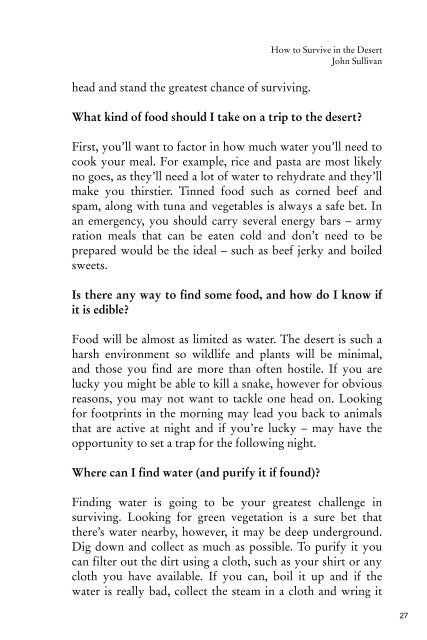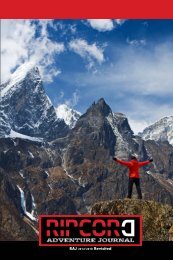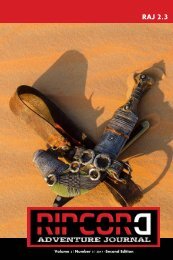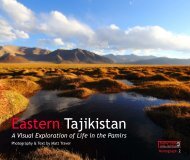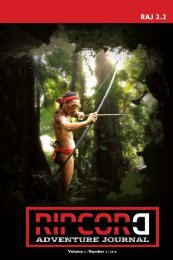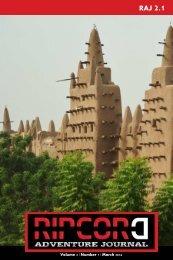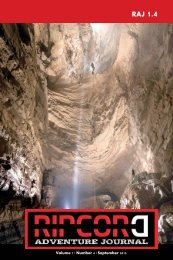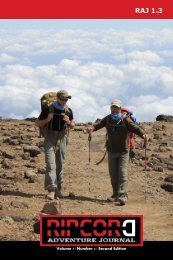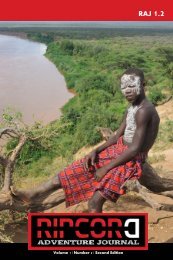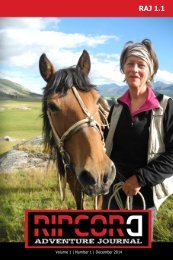Ripcord Adventure Journal 2.4
Our final issue of volume 2 is quite a mixture of adventure and exploration of the world's polar regions, deserts, oceans, mountains and jungles. In our Guest Editorial, Leon McCarron ventures in to the hills of Jordan as part of his 1000-mile journey on foot, across the Middle East, when he encounters an unexpected musical interlude on a lonely hillside. Planning is essential for major expeditions, even more important to have several back-up plans in case the first one or two, or three do not pan out as expected. Mark Wood brings us behind the scenes of planning for a polar expedition. Technology in the classroom has been touted for more than 2 decades as the next big thing. Here, Joe Grabowski, whose nascent organisation "Exploring by the Seat of Your Pants" has demonstrated that indeed technology can be the medium by which exposure to new and exciting educational contexts can be brought in to the classroom from the real-life connections with explorers, conservationists and scientists in the field. Former Marine Commando, John Sullivan gives us an introduction to what it takes to survive in the desert using the skills and experience he has built up from his time in the forces, leading expeditions and working with film crews on location. What does it take to circumnavigate the globe on one's own, what drives an adventurer to take on and complete such demanding challenges? Erden Eruc takes us with him on his life's journey across oceans and continents. Finally, we catch up with emergency medical doctor Claire Grogan and Mark Hannaford of World Extreme Medicine to discuss the fast-paced world of extreme medicine.
Our final issue of volume 2 is quite a mixture of adventure and exploration of the world's polar regions, deserts, oceans, mountains and jungles.
In our Guest Editorial, Leon McCarron ventures in to the hills of Jordan as part of his 1000-mile journey on foot, across the Middle East, when he encounters an unexpected musical interlude on a lonely hillside.
Planning is essential for major expeditions, even more important to have several back-up plans in case the first one or two, or three do not pan out as expected. Mark Wood brings us behind the scenes of planning for a polar expedition.
Technology in the classroom has been touted for more than 2 decades as the next big thing. Here, Joe Grabowski, whose nascent organisation "Exploring by the Seat of Your Pants" has demonstrated that indeed technology can be the medium by which exposure to new and exciting educational contexts can be brought in to the classroom from the real-life connections with explorers, conservationists and scientists in the field.
Former Marine Commando, John Sullivan gives us an introduction to what it takes to survive in the desert using the skills and experience he has built up from his time in the forces, leading expeditions and working with film crews on location.
What does it take to circumnavigate the globe on one's own, what drives an adventurer to take on and complete such demanding challenges? Erden Eruc takes us with him on his life's journey across oceans and continents.
Finally, we catch up with emergency medical doctor Claire Grogan and Mark Hannaford of World Extreme Medicine to discuss the fast-paced world of extreme medicine.
Create successful ePaper yourself
Turn your PDF publications into a flip-book with our unique Google optimized e-Paper software.
AAAAAAAAAAAAAAAAAAAAAAAAAAAAAAAAA<br />
AAAAAAAAAAAAAAAAAAAAAAAAAAAAAAA<br />
head and stand the greatest chance of surviving.<br />
How to Survive in the Desert<br />
John Sullivan<br />
What kind of food should I take on a trip to the desert?<br />
First, you’ll want to factor in how much water you’ll need to<br />
cook your meal. For example, rice and pasta are most likely<br />
no goes, as they’ll need a lot of water to rehydrate and they’ll<br />
make you thirstier. Tinned food such as corned beef and<br />
spam, along with tuna and vegetables is always a safe bet. In<br />
an emergency, you should carry several energy bars – army<br />
ration meals that can be eaten cold and don’t need to be<br />
prepared would be the ideal – such as beef jerky and boiled<br />
sweets.<br />
Is there any way to find some food, and how do I know if<br />
it is edible?<br />
Food will be almost as limited as water. The desert is such a<br />
harsh environment so wildlife and plants will be minimal,<br />
and those you find are more than often hostile. If you are<br />
lucky you might be able to kill a snake, however for obvious<br />
reasons, you may not want to tackle one head on. Looking<br />
for footprints in the morning may lead you back to animals<br />
that are active at night and if you’re lucky – may have the<br />
opportunity to set a trap for the following night.<br />
Where can I find water (and purify it if found)?<br />
Finding water is going to be your greatest challenge in<br />
surviving. Looking for green vegetation is a sure bet that<br />
there’s water nearby, however, it may be deep underground.<br />
Dig down and collect as much as possible. To purify it you<br />
can filter out the dirt using a cloth, such as your shirt or any<br />
cloth you have available. If you can, boil it up and if the<br />
water is really bad, collect the steam in a cloth and wring it<br />
27


